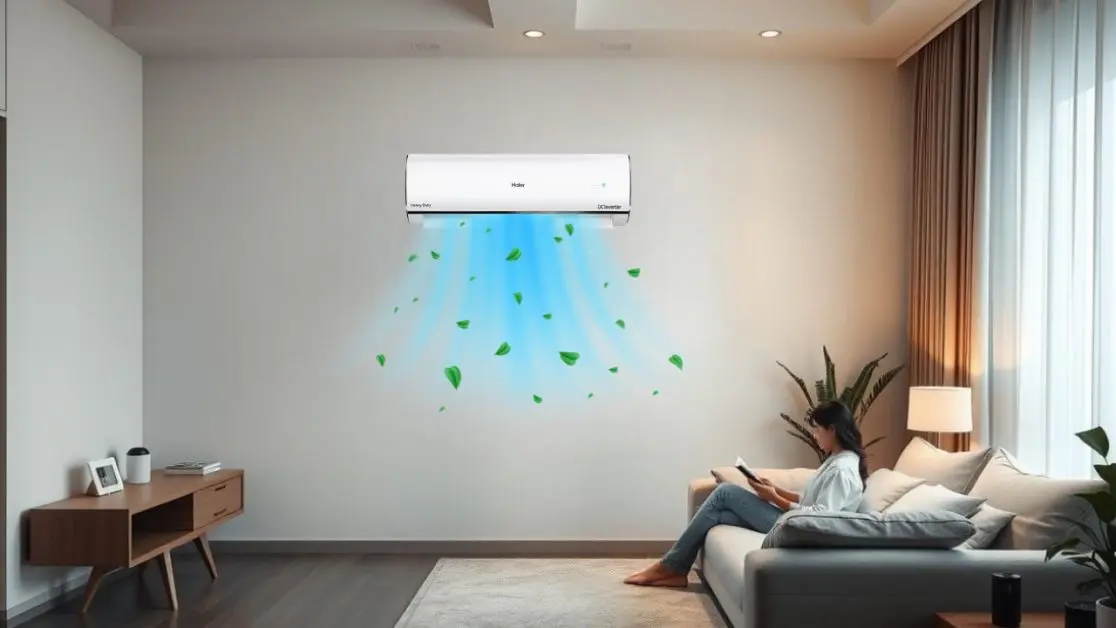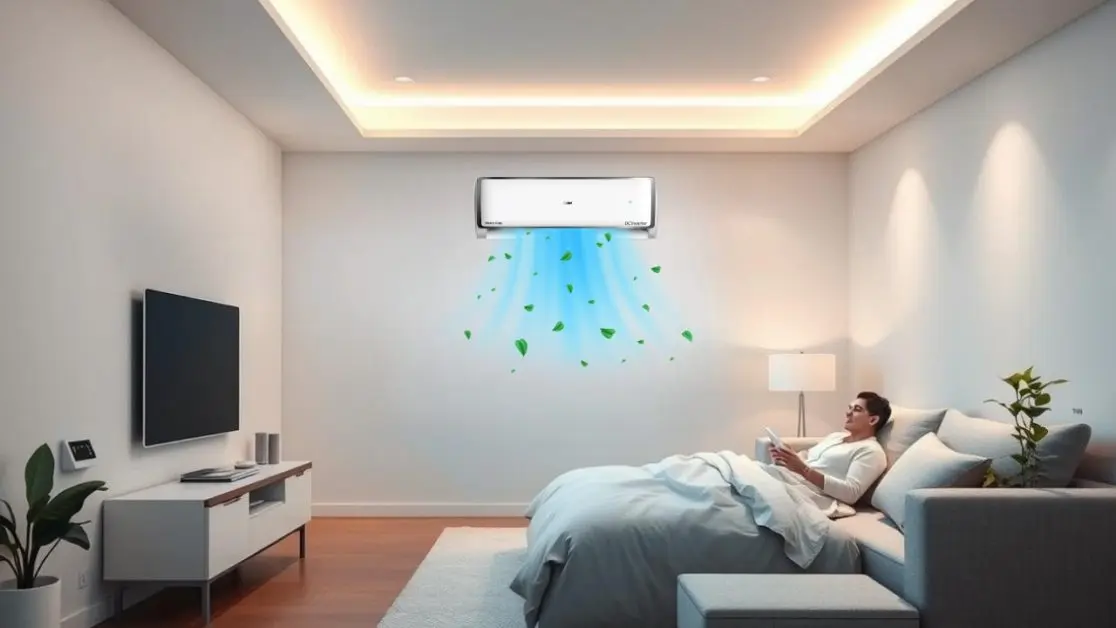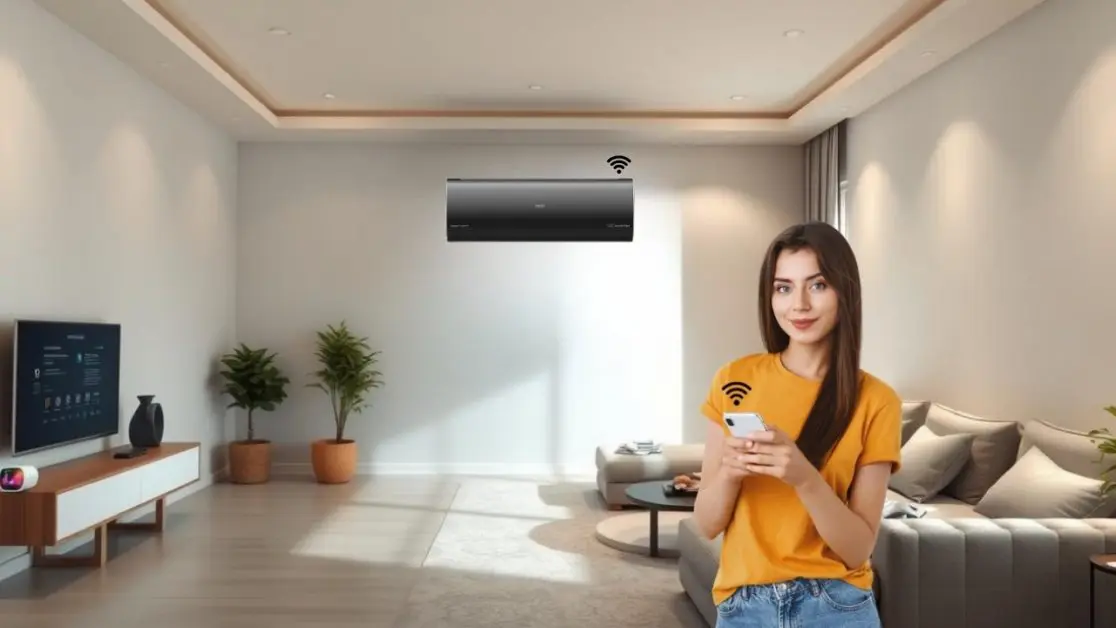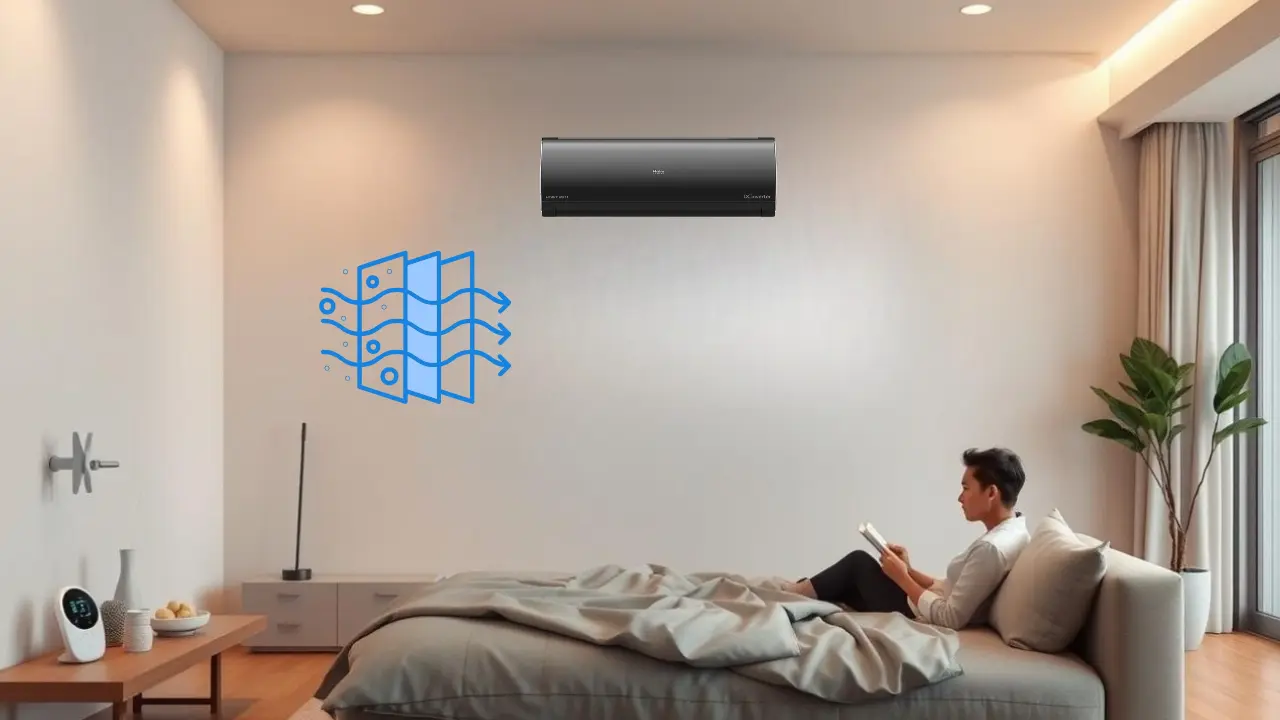With rising pollution levels and increasing concerns about indoor air quality, air conditioning systems are evolving beyond their traditional role of cooling.
Artificial Intelligence (AI) is transforming modern Air Conditioners into intelligent air quality controllers, capable of monitoring, analyzing, and improving air conditions in real time. Advanced sensors track temperature, humidity, carbon dioxide levels, and airborne contaminants, enabling AI to make instant adjustments for cleaner air.
In this article, we will explore how AI technology is revolutionizing air quality monitoring and filtration in modern air conditioning systems. We will discuss the role of AI in detecting pollutants, optimizing filtration, and enhancing energy efficiency.
Additionally, we will examine how AI-driven AC systems contribute to healthier indoor environments by proactively managing air quality in real time.
1. The Importance of AI in Managing Air Quality

Indoor air quality has become more crucial than ever. The high levels of pollution in cities and the rise of various allergens and contaminants demand a shift from traditional air conditioning units. AI is set to revolutionize air filtration and quality monitoring.
- Issues Surrounding Indoor Pollution: Urban development leads to increased indoor contaminants, reducing air quality and negatively impacting health.
- Problems with Conventional Air Conditioner Filtration Systems: Traditional filters remove only a limited number of particles and cannot dynamically respond to fluctuating air quality parameters.
- AI’s Contribution to Air Purification: AI-driven systems provide accuracy, automation, and predictive capabilities, transforming air quality control.
Smart Air Conditioners equipped with AI go beyond cooling; they actively purify the air by detecting impurities in real time and taking preventative action to enhance indoor air quality.
2. What is AI Air Quality Monitoring?
AI air quality monitoring refers to the use of Artificial Intelligence to continuously track, analyze, and improve indoor air conditions. Unlike traditional systems that rely on periodic checks and static filtration, AI-powered monitoring uses smart sensors to detect pollutants such as dust, allergens.
AI significantly improves air quality monitoring through its ability to continuously analyze and adjust environmental parameters.
Real-Time Data Collection
Unlike traditional AC systems that require periodic maintenance and checks, AI-powered solutions offer continuous real-time monitoring. AI-enhanced air conditioners utilize multiple sensors to track:
- Temperature and humidity levels
- Carbon dioxide (CO2) levels
- Volatile Organic Compounds (VOCs)
- Particulate matter (PM2.5 and PM10)
- Allergens and airborne bacteria
Through this approach, AI-powered AC systems build an accurate picture of indoor air conditions, enabling better air quality management.
3. AI and Predictive Analysis for Air Quality Improvement

Predictive analysis is a key advancement in AI research and development. Rather than merely reacting to existing air quality issues, AI-equipped AC systems predict potential problems using static data and other metrics.
- Recognition of Patterns: AI algorithms assess past and current data to forecast future air quality conditions.
- Proactive Adjustments: AI can modify filtration efficiency and activate purification modes preemptively upon detecting indicators of declining air quality.
- Pollution and Weather Monitoring: AI integrates external air quality data to monitor contamination levels and adjust settings accordingly.
This ensures clean indoor air without requiring users to wait for issues to arise.
4. Smart AI Filtration in Air Conditioners
Filtration is essential for any air conditioning unit. AI enhances filter efficiency, improving air cleaning through intelligent, responsive technology.
Adaptive Technology: Filtration
AI-driven AC systems utilize real-time data to determine the most effective filtration methods.
- Dynamic Filter Adjustment: AI technology automatically modifies filter settings based on detected air pollutants.
- Smart Notifications for Filter Replacement: Instead of following a fixed schedule, AI notifies users when filters require cleaning or replacement for optimal performance.
- Automatic Airflow Control: AI adjusts airflow intensity according to pollution levels.
These features optimize air quality while minimizing unnecessary energy consumption.
Multi-Stage Filtration Integration
AI enhances multi-stage filtration systems, ensuring thorough air purification.
- Pre-filters: Capture large dust particles and allergens.
- HEPA filters: Remove fine particles like bacteria and pollen.
- Activated Carbon Filters: Absorb fumes and harmful odors.
- UV-C Purification: AI governs the use of UV-C light to neutralize airborne viruses and bacteria.
By intelligently managing these filtration stages, AI-powered AC units achieve maximum air purification with minimal energy use.
5. Smart Airflow Optimization
AI not only filters air but also optimizes its distribution within a room.
Personalized Cooling and Air Distribution
AI-powered ACs do not distribute air uniformly like traditional units; they adjust airflow based on occupancy and air quality.
- Zonal Cooling: AI directs air toward occupied areas.
- Airflow Control Based on Pollutant Hotspots: AI identifies pollution-prone areas and redirects clean air accordingly.
- Energy Efficiency Improvements: AI optimizes airflow for energy savings while maintaining superior air quality.
This intelligent air distribution enhances comfort and efficiency.
6. AI-Powered Automation and Smart Home Integration

AI-powered ACs integrate seamlessly into smart home ecosystems, making air purification more automated than ever.
Voice and App-Based Control
Voice commands and smartphone apps allow users to manage AI-enabled AC systems from anywhere. This technology enables users to:
- Access real-time air quality data
- Adjust settings remotely
- Receive notifications for air quality updates and filter replacements
IoT and AI Combination
AI-enabled AC systems communicate with other smart devices via IoT technology:
- Smart Thermostats: AI collaborates with thermostats to optimize energy usage.
- Air Purifiers: AI coordinates AC filters with standalone air purifiers for enhanced performance.
- Wearables and Health Gadgets: AI adjusts air quality settings based on health data from smart wearables.
This interconnected approach ensures a responsive and intelligent air quality management system.
The integration of AI and IoT has transformed home appliances into intelligent, self-optimizing systems that enhance efficiency and convenience.
By enabling real-time data exchange and automation, AI-powered IoT devices adapt to user preferences, improve energy efficiency, and create a seamless smart home experience.
The Future of AI in AC Air Quality Management
Continued advancements in AI technology promise even more efficient air quality control solutions.
Self-Learning AI Systems and Remote Control Units
Future AC models will feature self-learning AI systems that automatically adjust based on user preferences, air quality data, and environmental conditions. As these systems evolve, indoor air quality will progressively improve for healthier living spaces.
Nanotechnology and AI Filtration Sensors
Advancements in AI-powered sensors will enable:
- More precise allergen tracking
- Improved pollutant detection accuracy
- Real-time allergen monitoring
Nanotechnology may further enhance AI-powered filtration, creating self-cleaning air filters with superior pollutant removal capabilities.
Green Solutions with AI Energy-Efficient ACs
Future AI-powered air conditioners will integrate renewable energy sources, allowing for:
- Sustainable air purification solutions
- Reduced carbon footprints via AI-optimized energy consumption
- Smart grid integration for maximum power savings
Embracing AI in air conditioning will not only improve indoor air quality but also contribute to global energy conservation.
Ending Note!
Artificial Intelligence is reshaping the way air quality is monitored and managed in modern air conditioning systems.
By leveraging real-time data, predictive analytics, and smart automation, AI-driven ACs go beyond basic cooling to actively purify indoor air, ensuring healthier and more comfortable living spaces. These intelligent systems detect pollutants, adjust filtration levels, and optimize airflow to maintain optimal air quality with minimal human intervention.
As AI technology continues to advance, air conditioners will become even more adaptive, integrating with IoT devices, self-learning algorithms, and energy-efficient filtration solutions.
The future of air conditioning lies in its ability to create cleaner indoor environments while minimizing energy consumption and reducing environmental impact.
AI-powered air quality management is not just an innovation, it is a necessity for sustainable, healthier living.
Looking for cutting-edge smart home appliances? Visit the Haier India website to explore a wide range of air conditioners, refrigerators, and more. Experience the future of home automation with innovative, energy-efficient, and intelligent solutions designed for modern living.

